Become an expert on Belgian beer history with these 10 books
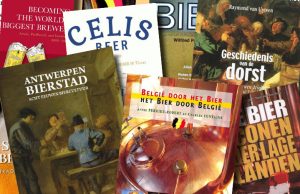 Studying Belgian beer history can be overwhelming. Even I have a huge pile of books and articles that are still waiting for me to read them. But what if you’d just like a manageable introduction by going through some of the most relevant literature available? It’s the summer holidays, so brush up your knowledge reading on the beach, at the campsite, under a tree or in your tent. And brush up your Dutch and French, because sorry, English speakers: the world doesn’t revolve around you this time.
Studying Belgian beer history can be overwhelming. Even I have a huge pile of books and articles that are still waiting for me to read them. But what if you’d just like a manageable introduction by going through some of the most relevant literature available? It’s the summer holidays, so brush up your knowledge reading on the beach, at the campsite, under a tree or in your tent. And brush up your Dutch and French, because sorry, English speakers: the world doesn’t revolve around you this time.
Unfortunately, there are just so many books out there that teach you not that much. Books full of falsehoods and irrelevant facts, or only covering a very narrow aspect of beer culture. How often have we had to read that duke John of Brabant was the same person as the legendary beer king Gambrinus? How many books keep on bleating about the Bavarian Reinheitsgebot from 1516, which in reality had about as much influence on Belgian beer history as, say, 1969’s moon landing? How many beer books aren’t plagued by cooking recipes, fairy tales about knights and fastidiously repeated hogwash?
So, which books can actually tell you something useful? How do you become an expert on Belgian beer in ten books?
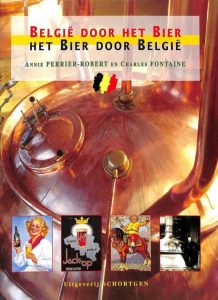 Anne Perrier-Robert and Charles Fontaine, Belgium by beer, beer by Belgium, Esch-sur-Alzette 1996.
Anne Perrier-Robert and Charles Fontaine, Belgium by beer, beer by Belgium, Esch-sur-Alzette 1996.
This book, originally published in French and also available in Dutch, is in fact the best easily accessible work on Belgian beer that I know of. No subject is missing, from the Middle Ages to the First World War, from brewers’ associations to production statistics, from lost beer types to Belgian brewers abroad, and all that with wonderful illustrations. A little dated here and there, not always that accurate when it comes to details, but it remains the entry level model for those who really want to learn something.
 Kenneth Bertrams et al., Becoming the world’s biggest brewer. Artois, Piedboeuf and Interbrew (1880-2000), Oxford 2020.
Kenneth Bertrams et al., Becoming the world’s biggest brewer. Artois, Piedboeuf and Interbrew (1880-2000), Oxford 2020.
A thorough scientific work on how the Artois and Piedboeuf breweries teamed up as Interbrew and later AB InBev to conquer the world. In passing, the writers also cover the entire Belgian beer history of the 19th and 20th centuries, and all that written in accessible way and not as a Stella or Jupiler advert. Nice! Statistics, the odd anecdote, this can really teach us something. Skip the bits on shares and family capital if you like. If you’re into this sort of corporate stuff, De Belgische bierbaronnen (‘The Belgian beer barons’, in Dutch) by Wolfgang Riepl is also very much recommended.
 Ivan Derycke (ed.), Antwerpen bierstad. Acht eeuwen biercultuur, Brasschaat 2011.
Ivan Derycke (ed.), Antwerpen bierstad. Acht eeuwen biercultuur, Brasschaat 2011.
Sorry, this one is in Dutch. A flagstone-sized volume with everything you’d ever want to know about beer from Antwerp, written by a knowledgeable team of authors (not counting blundering ‘hop professor’ Denis De Keukeleire). From the Middle Ages to the present day, and what goes for Antwerp, also goes for Belgium as a whole, broadly speaking. Here, this book also represents the many other great books and booklets about the beer history of various other cities, regions or specific breweries, like the ones by Erik Aerts, Frank Becuwe, Chris Vandewalle, Paul Daeleman and many others. Most of these are in Dutch: the number of similar books on Wallonia is decidedly smaller.
 Raymond van Uytven, Geschiedenis van de dorst. Twintig eeuwen drinken in de Lage Landen, Leuven 2007.
Raymond van Uytven, Geschiedenis van de dorst. Twintig eeuwen drinken in de Lage Landen, Leuven 2007.
Van Uytven was professor at Leuven university and has published various scientific articles and books on beer. This book however, literally a ‘History of thirst’ in the Low Countries, is aimed at a larger audience and talks about the history of not just beer, but wine, gin and other beverages as well. Though intended to appeal to a lay public, and full of useful information, it can occasionally be a rather dry read. Let’s just say that it can make you thirsty for a good pint, then.
 Wilfried Patroons, Bier, Antwerp 1979.
Wilfried Patroons, Bier, Antwerp 1979.
This book, also published in French as La route belge de la bière, was in fact the first book written on Belgian beer for a wide audience. Patroons was publisher at Spectrum, responsible for the Dutch edition of Michael Jackson’s 1977 The world guide to beer. He was then challenged to write his own book on just the beers of Belgium. Its historical value mainly lies in its wonderful snapshot of the beer landscape as it was then, with many small breweries that have since disappeared. Also, it’s noteworthy for what is doesn’t contain: ‘classic’ beers like Kwak, Chouffe, Delirium Tremens and many others simply didn’t exist yet, while some beers had not yet gained their later renown, such as Saison Dupont.
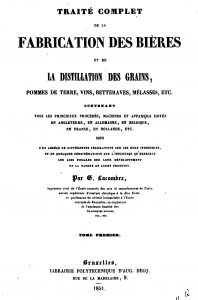 Georges Lacambre, Traité complet de la fabrication de bières et de la distillation des grains, pommes de terre, vins, betteraves, mélasses, etc., Brussels 1851.
Georges Lacambre, Traité complet de la fabrication de bières et de la distillation des grains, pommes de terre, vins, betteraves, mélasses, etc., Brussels 1851.
Time to brush up your French, because this is the 19th century work of reference on Belgian beer. French brewing engineer Georges Lacambre was the first to write this exhaustively and scientifically on the subject, including all relevant Belgian beer styles of the time. Perhaps a little dry, but a very precise snapshot of brewing in Belgium as it would continue up to the First World War without too much change. What’s more, it’s available on Google Books. For those who prefer reading in Dutch, there’s Hendrik Verlinden’s Praktisch handboek der gisting-industries from 1916, the first serious Belgian brewing handbook in Dutch. It can be read online at the website of the Dutch Royal Library in The Hague.
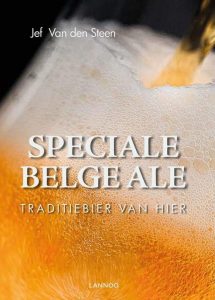 Jef Van den Steen, Speciale Belge Ale. Traditiebier van hier, Tielt 2016.
Jef Van den Steen, Speciale Belge Ale. Traditiebier van hier, Tielt 2016.
Van den Steen has written many beer books, some of which have been translated into English and French, but this is one of the better ones. No irrelevant cooking recipes or romantic musings, but a fine survey of Belgian beer of the period 1900-1940, and a description of the spéciale belge style in the remainder of the century. In English, check out Van den Steen’s Belgian Trappist and abbey beers: rather limited in scope (abbeys have not been all that important for Belgian beer history), but generally based on solid facts.
![]() Jan Machiel van Bragt en Toon van den Reek, De biericonen der Lage Landen, Zwijndrecht 2017.
Jan Machiel van Bragt en Toon van den Reek, De biericonen der Lage Landen, Zwijndrecht 2017.
Beer icons of the Low Countries: knowledge of history goes hand in hand with knowing the breweries that are still around, and with personal accounts from the brewers. There’s a lot to be found in this genre, but I found this book to be among the better ones, with a good selection of breweries and personalities.
 Jemery Banas, Celis beer. Born in Belgium, brewed in Texas, Charleston 2021.
Jemery Banas, Celis beer. Born in Belgium, brewed in Texas, Charleston 2021.
The story of the man who really was Belgium’s first ‘craft brewer’, who against all odds just started brewing what he liked instead of doing it for the big money. Including an excellent contribution by Yvan de Baets on historical white beers, making up for his earlier, rather sketchy article on saison history. In any case, brewers’ biographies are interesting reads for those who want to understand the goings-on in the brewing world, such as Hugo Camps’ book on Constant Vanden Stock (Bellevue), Vijftig jaar brouwer on Luc Van Honsebrouck (Kasteelbier among others) or My Chouffe story by Chris Bauweraerts.
 Geert van Istendael, Het Belgisch labyrint, Amsterdam/Antwerp 2011 (revised edition).
Geert van Istendael, Het Belgisch labyrint, Amsterdam/Antwerp 2011 (revised edition).
Also published in French as Le labyrinthe belge. It does not mention the word ‘beer’ a lot, but if you really want to know something about Belgian beer, you need to understand at least something of the country itself. Its history and its many political and cultural controversies. The repression of the Dutch language, the Brussels question, the linguistic divide, the role of the Church, the wars, the spatial planning or the lack thereof. After all, what is Belgium, and what is a Belgian? Is it more than just a sum of its parts? Also recommended as a follow-up is Arm Brussel (‘Poor Brussels’) by the same author.
Finally, the definitive one book that contains it all, in English, has yet to be written. I guess it is once again up to me then…
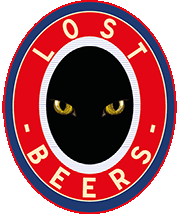





“I guess it is once again up to me then…” – this goes in at number one on my Christmas list!